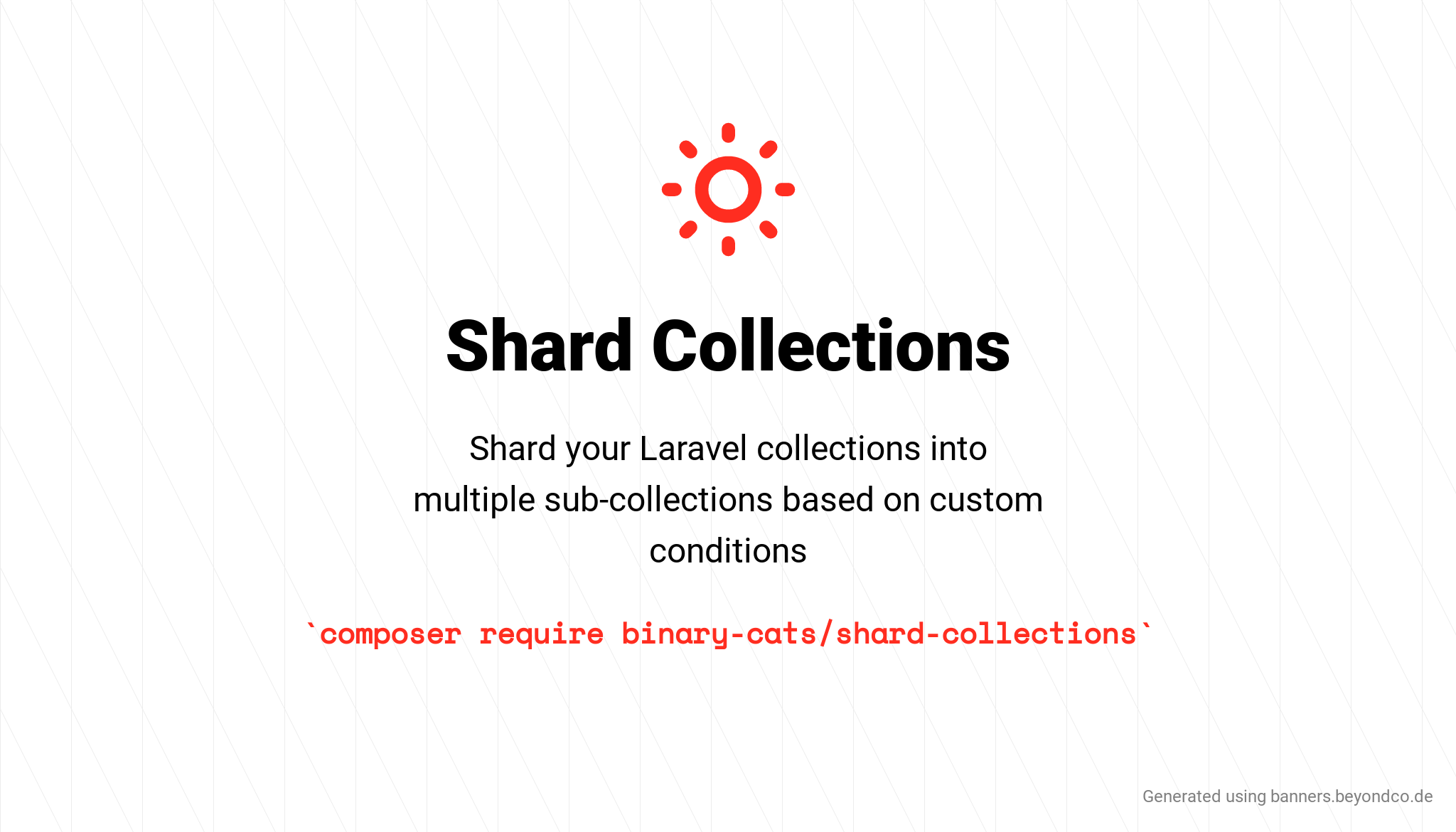A Laravel package that provides powerful collection macros for sharding collections into multiple sub-collections based on custom conditions.
You can install the package via composer:
composer require binary-cats/shard-collectionsThis package provides two collection macros: shard() and shardWithKeys(). Both allow you to split a collection into multiple sub-collections based on custom conditions.
The shard() method splits a collection into multiple sub-collections based on a series of conditions. Each condition is evaluated in order, and items that match a condition are moved to the corresponding sub-collection. Any remaining items are placed in the final sub-collection.
use Illuminate\Support\Collection;
$collection = collect([1, 2, 3]);
$map = [
fn ($item) => $item > 10, // First condition
fn ($item) => $item < 2, // Second condition
];
$output = $collection->shard($map);
// Result:
// [
// collect([]), // Items > 10 (none)
// collect([1]), // Items < 2
// collect([2, 3]) // Remaining items
// ]You can also preserve the original keys by passing true as the second parameter:
$output = $collection->shard($map, true);
// Result:
// [
// collect([]), // Items > 10 (none)
// collect([0 => 1]), // Items < 2 (with original keys)
// collect([1 => 2, 2 => 3]) // Remaining items (with original keys)
// ]The remainder is included when it is not empty. You can force remainder by passing the last argument
$output = $collection->shard(
map: $map,
forceRemainder: true
);
// Result:
// [
// collect(['one' => 1, 'two' => 2, 'three' => 3]), // Remaining items
// collect([]) // Remainder is empty, but is included
// ]The shardWithKeys() method works similarly to shard() but allows you to specify custom keys for each sub-collection. This is particularly useful when you want to give meaningful names to your sharded collections.
$collection = collect([1, 2, 3]);
$map = [
'high' => fn ($item) => $item > 10, // First condition
'low' => fn ($item) => $item < 2, // Second condition
];
$output = $collection->shardWithKeys($map, 'medium');
// Result:
// [
// 'high' => collect([]), // Items > 10 (none)
// 'low' => collect([1]), // Items < 2
// 'medium' => collect([2, 3]) // Remaining items
// ]You can also preserve the original keys by passing true as the third parameter:
$output = $collection->shardWithKeys($map, 'medium', true);
// Result:
// [
// 'high' => collect([]), // Items > 10 (none)
// 'low' => collect([0 => 1]), // Items < 2 (with original keys)
// 'medium' => collect([1 => 2, 2 => 3]) // Remaining items (with original keys)
// ]Both methods work seamlessly with associative collections:
$collection = collect(['one' => 1, 'two' => 2, 'three' => 3]);
$map = [
'small' => fn ($item) => $item < 2,
'large' => fn ($item) => $item > 10,
];
$output = $collection->shardWithKeys($map, 'medium', true);
// Result:
// [
// 'small' => collect(['one' => 1]),
// 'large' => collect([]),
// 'medium' => collect(['two' => 2, 'three' => 3])
// ]The remainder is included when it is not empty. You can force remainder by passing the last argument
collect(['one' => 1, 'two' => 2, 'three' => 3])->shard(
map: [fn ($item) => $item < 10],
forceRemainder: true
);
// Result:
// [
// collect(['one' => 1, 'two' => 2, 'three' => 3]) // Remaining items
// collect([]) // Remainder is empty, but is included
// ]When you provide an empty map, both methods will return a single collection containing all items:
$collection = collect([1, 2, 3]);
$output = $collection->shard([]);
// Result: [collect([1, 2, 3])]
$output = $collection->shardWithKeys([], 'all');
// Result: ['all' => collect([1, 2, 3])] composer testThe MIT License (MIT). Please see License File for more information.
